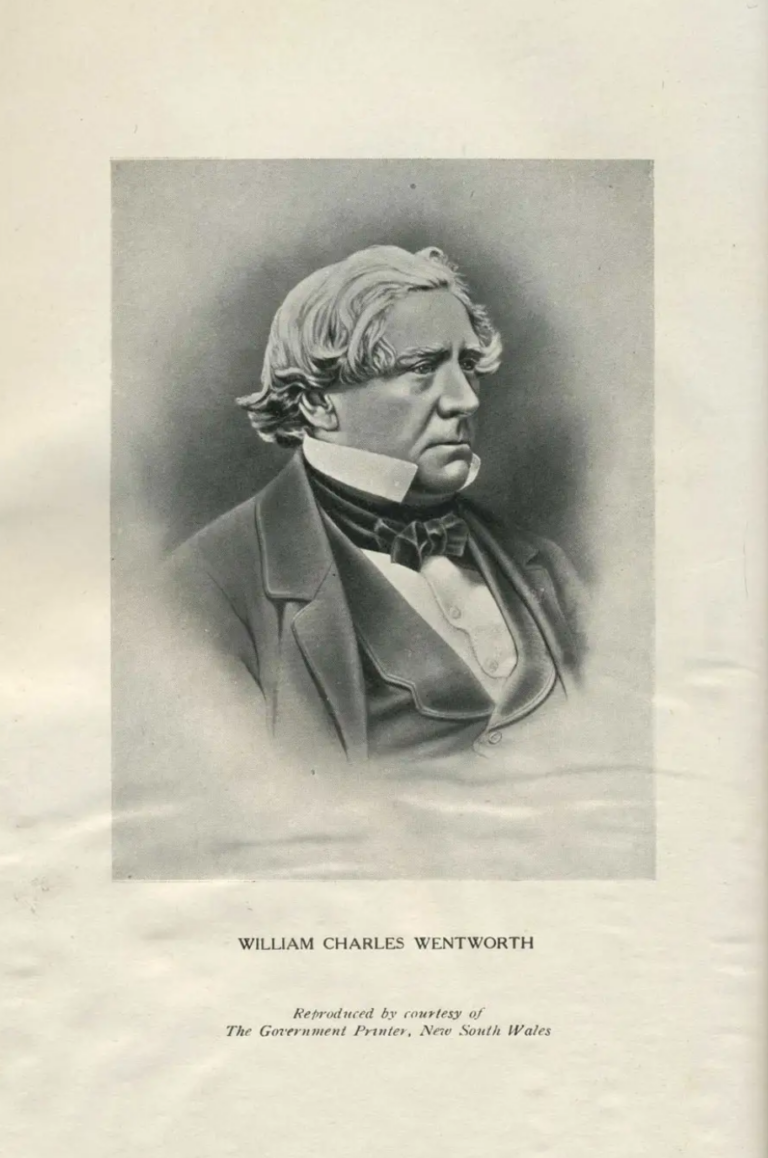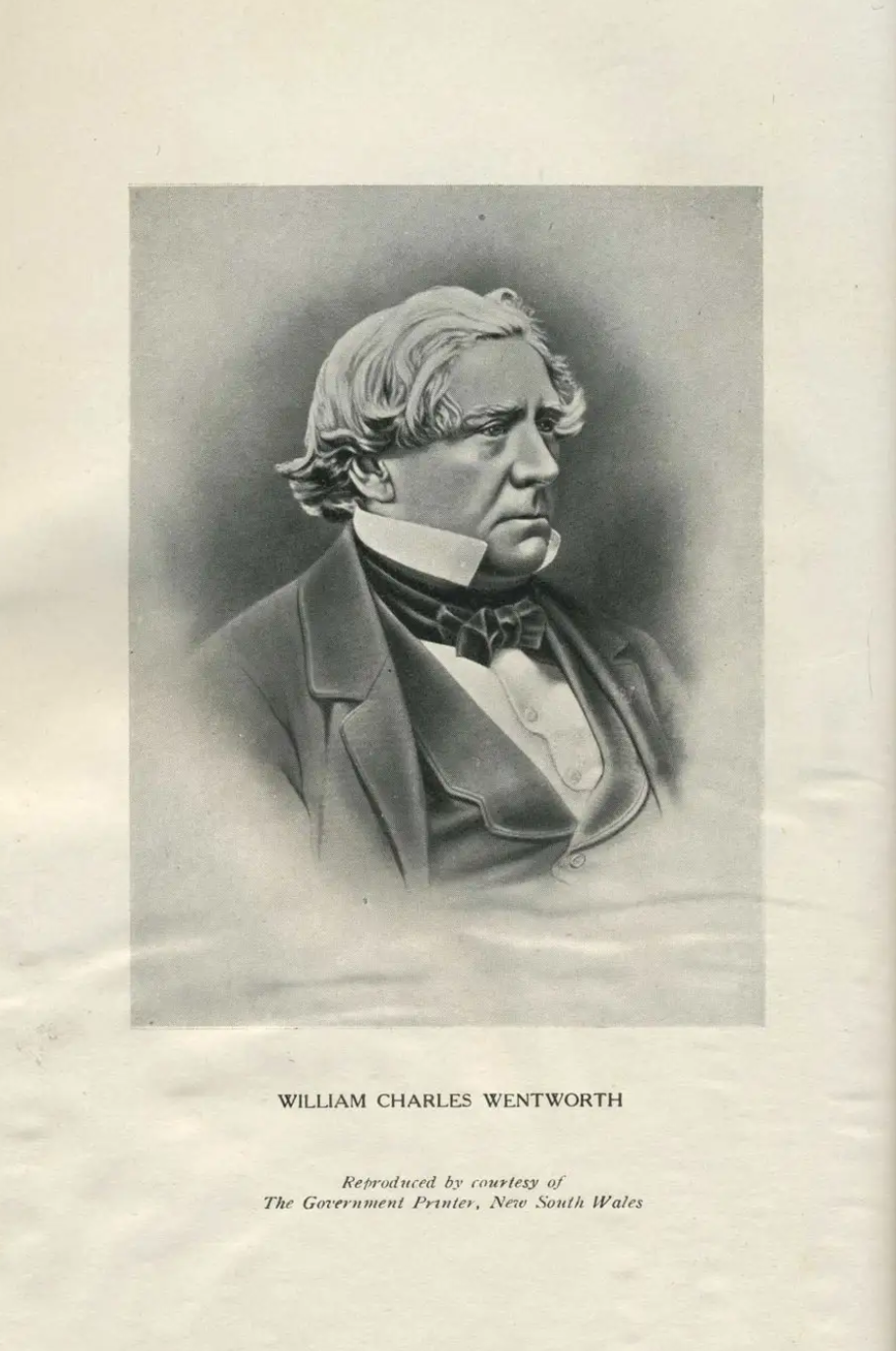A.C.V. Melbourne, William Charles Wentworth (1971)
What are the essential stories one must read to garner an understanding of Australian history? The Menzies Collection contains several books that fall into the category of ‘must read’ such as W.K. Hancock’s Australia or Geoffrey Blainey’s Tyranny of Distance. But while A.C.V. Melbourne may not be as well remembered as those authors, his biographical subject, William Charles Wentworth, is arguably the individual whose life most directly embodies the Australian story.
Wentworth was perhaps the most remarkable Australian that has ever lived. His father D’Arcy was from an Anglo-Irish family with aristocratic connections, and he was thrice let off on charges of highway robbery. D’Arcy survived a fourth charge only by promising to take up a job as government surgeon in the military colony of New South Wales. He sailed on the ship Neptune, on which he met and impregnated the convict Catherine Crowley. She gave birth to William off the coast of Norfolk Island in 1790 – making him one of the first ‘native born’ settlers.
The child produced by the illicit coupling grew into an imposing figure, tall with broad shoulders, Wentworth had a keen intellect that made him successful at virtually everything he tried. His mother died while he was still young, and he was sent to England to receive a broad education. When he returned in 1810, he appeared as a ‘Gulliver in Lilliput’, with talents that overshadowed the small colonial world in which he lived. His earliest claim to fame was as the first ‘European’ to discover a passage across the Blue Mountains, opening up NSW’s pastoral horizons in a manner that would help turn the Colony into a great wool exporter. In 1819 he also wrote a flattering book on NSW – the first ever published by an Australian-born author – which was reissued several times and further helped to stimulate the wool boom. Ever the entrepreneur, later in life he was almost successful in buying a third of New Zealand.
Wentworth was a keen critic of the ‘exclusives’, the leading group in Sydney society who wanted to restrict the rights of those with convict connections and prevent any from achieving power or prominence. Melbourne describes him as having an ‘inborn hatred of oppression and an academic attachment to liberal principles’, although equally he suggests that Wentworth’s opposition to the exclusives really manifested itself when he discovered his own convict origins. NSW had no free press in its early days, but Wentworth was responsible for a number of ‘pipes’, circulated anonymous writings criticising the government. Later he was involved in setting up the Australian, the first privately owned newspaper in the colony and one that had the audacity to start printing without a license and dare the government to shut it down.
A firm believer in the British Constitution, Wentworth became a tireless campaigner against the autocratic institutions of NSW’s military government. This meant fighting for trial by jury, taxation by consent, and representative government. Wentworth was incredibly successful in these endeavours. He saw off an attempt by Governor Darling to regulate newspapers and won the right to have civilian juries adjudicate civil cases. So fierce were his clashes with Darling that when the Governor’s term expired, Wentworth invited half of Sydney to his Vaucluse property to drunkenly see Darling’s ship sail away. As a founding member of the Australian Patriotic Association, Wentworth won the 1842 reforms which gave NSW a Legislative Council with two-thirds elected members. And as a member of that council he was instrumental in founding the University of Sydney, partly with his own money, and helping to set up NSWs first public schools.
Wentworth’s greatest victory was to win full self-government for his Colony and write its Constitution. This was the precedent that would allow the other Colonies to gain self-government and ultimately lead to federation, but Wentworth has never been given the full credit he deserves. This is because he was man with set political beliefs who did not change with the times. As a Whig-liberal he believed firmly in the liberties of the British Constitution and wanted to extend them to Australia. In the early colonial period this made him a radical, but by the late 1840s, his desire to keep Britain’s property qualifications and unelected upper house made him seem like a conservative. Wentworth still fundamentally believed in social mobility and individual freedom, but he had a nineteenth century fear of mob rule and wanted those who voted to have a stake in society. The conservative aspects of his Constitution led to much criticism in the 1850s, but with hindsight we can see that he was able to create a successful and enduring political system, not only for NSW, but for Australia. In true British fashion he produced a respected but adaptable Constitution, which was able to allow for the later introduction of a universal franchise and an elected upper house. Though he may not have agreed with them, the peaceful imposition of these reforms ironically prove Wentworth’s success.
You might also like...
Sign up to our newsletter
Sign up for our monthly newsletter to hear the latest news and receive information about upcoming events.



